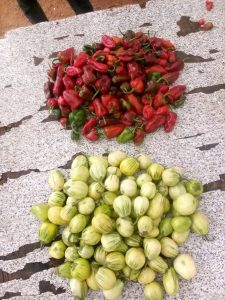By Abdurrahim Ibrahim

It was an early hour on a July day, Maryam Umar, a 300-level Law student, woke up with the usual passion to have a delicious meal. As an average Danfodite, Maryam is not of the rich class whose cravings span across different dishes from the fancy restaurants that define Sokoto’s culinary landscape. Cooking was thus the obvious choice.
However, the unwavering zeal for the kitchen that morning would later leave her body, upon the discovery that pepper’s price had skyrocketed, even on the verge of becoming unaffordable.
“The price of pepper is too outrageous and above the means of lots of students, ₦500 pepper, which I got that day can’t even make a proper meal,” she said.
The scarcity and hike in price of pepper affected the meal choices of Maryam, which led her to resort to an alternative she barely used when things were normal.
“I’ve been taking noodles consistently since the hike, so I just take noodles with grounded pepper. I started using grounded pepper until it finished too and I’m now back to square one.” She lamented.
However, Maryam is not alone. The scarcity and cost of pepper is the new rhythm in the mouth of students at the UDUS main Campus.
Nafisat Ibrahim, a 400-level Agriculture student expressed her concern over the trending matter.
“I really feel bad about the scarcity and unavailability, the thing is even if someone has money, to get the pepper is the major problem, as it became gold these days. So, that led me to start using dried pepper which is expensive too but more affordable,” she mentioned.
The high cost of pepper nowadays doesn’t only affect students meal choices but sending a declining signal to their financial stability, Nafisat’s comment affirmed that:
“Any student who agrees to continue purchasing pepper at the same rate, there’s a high tendency that his pocket might get dry before the end of the semester.”
“The unavailability and hike in prices of vegetables particularly pepper and tomatoes within the Campus premises, has significantly affected the choices of my meals, there are Days I wish to make stew using fresh tomatoes, because it’s more delicious and adds to the aroma of the stew, but considering the price and low quality of the tomatoes I would have to opt for sachet tomatoes and dry pepper which are also costly but more available than the fresh ones,” whined Gladys Obasi, a Practical-year student of Agriculture.
However, she was convinced by one of the vendors close to her hostel that it happened due to the change in climate, that’s why the fresh peppers are out of season, and that’s the main reason why the prices skyrocket.
“Based on my interaction with one of my favorite vendors at the hostel mini Mart. The prices of these items fluctuate on a daily basis, that’s due to the items being out of season, hence the reason behind the price hiking,” she explained.
Pepper Vendors React
Abdullahi Musa, a pepper vendor at the school mini-mart reacted to the predicament, he attributed the expensivity to the change in climate which led the items out of season and high cost of transport fare before importing it from where it’s available.
“The issue of rise in pepper and other vegetables’ price has a good relation with change in climate, which led the commodities to run out of season, presently, there are only limited places in the whole Nigeria that have the availability of these culinary vegetables during this season. The amount we pay for their transportation also contributes to the price hike.”
It’s evident that anything that deals with climate oscillates with time, in respect to the fact, the pepper vendor affirmed to that by narrating the amounts they pay to purchase the products sometimes.
“Somedays, we use to purchase a whole bag of pepper at the rate of ₦20k and ₦30k or even below, but today, due to the change in climate and distance of the transporting places a medium sack of pepper costs over ₦100k and the transport fee too is not friendly, which led to difficulty in purchasing the commodity and significantly depleting the profit,” he stated.
Musa narrated how the price hike is affecting their business and reducing the quantity of the products imported.
“The hike in the price also affects the quantity of the items we do import, as you see I’m blending pepper with garden egg, to substitute other items I can’t afford, it’s not even part of the items I sell but the circumstances led to that.”
Hike In Commodity Prices
Change in climate is indubitably the leading factor to the rise in price of culinary and vegetables including pepper. This resulted in the scarcity of the products in the nearing states, except being imported from a far which is another expense.
A report by Daily Trust showed that prices of tomatoes, pepper skyrocketed in Kano, Taraba, and others. A visit to Yan Kaba vegetable market revealed that there was a moderate supply of perishable goods in the market, but with fewer buyers.
It was observed that a basket of tomato sold at ₦11,000 to ₦13,000 last week is now selling at ₦28,000 to ₦35,000, while a basket of pepper was sold at about ₦43,000.
Hearing from Expert
A Kano based agriculture economist, Lawan Adam said in discussion with Daily Trust’s correspondent that, “the only measure to be taken is the adoption of effective preservation mechanisms that will allow farmers and marketers of perishables to adopt simple measures of preserving their produce during the glut period.”
He further explained that farmers have been suffering from post-harvest losses for long, saying it is the goodwill of farming that kept them going.
He also warned that the issue may over power the farmers and they may decide otherwise.
